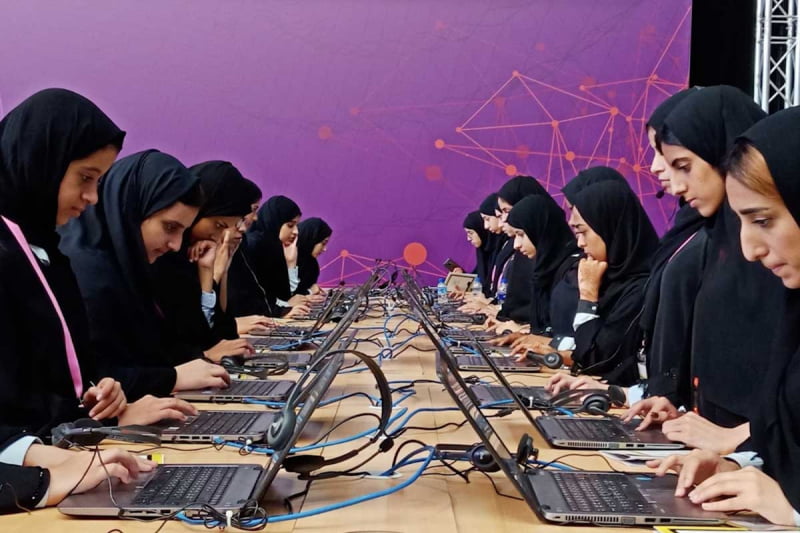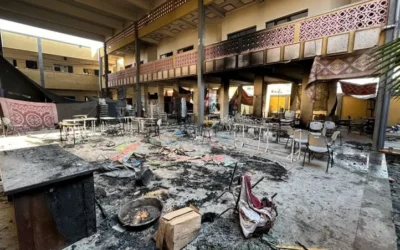The role of workplace learning in empowering future-ready graduates
Author: Dr. Sonia Ben Jaafar
Publication: Arabian Business
As we navigate through the aftermath of a global pandemic and face the evolving demands of the world of work, there is an urgent call to action to transform our education systems, particularly in the Middle East and North Africa. The World Economic Forum’s 2023 Future of Work report paints a promising yet challenging picture.
In the face of these realities, the necessity for workplace learning experiences that provide real-world skills and experiences for university graduates is undeniable.
In the MENA region, the situation is more acute. The region has been grappling with persistently high rates of unemployment. We are now projected to suffer unemployment rates of 11.2 percent and 9.3 percent, respectively, in 2023. Even as the world economy is expected to grow by a modest 2.8 percent in 2023, the employment divide is growing, and our region is at the sharp end of this trend.
The International Labour Organisation (ILO) tells us that these figures do not even tell the full story. The ‘jobs gap’ – the difference between those who want to work and the availability of jobs – is more severe in low-income countries. The global jobs gap in 2023 is estimated to be 11.7 percent, but in lower-income countries, it is a staggering 21.5 percent.
This divide is being exacerbated by the lingering effects of the pandemic and geopolitical conflicts, pushing up inflation, interest rates, and currency depreciation. These mounting challenges create an environment where entering the job market becomes increasingly critical for young people in the region who just want a decent livelihood.
This is the reality faced by our university graduates, who have done their jobs to date by doing well in school and pursuing higher education. However, they are being told by employers it is simply not enough! Today, workplace learning experiences such as internships have never been more essential to our economic development.
They offer a necessary bridge between academic learning and the practical skills employers are seeking. They enable graduates to transition smoothly into the workforce, enhancing their employability and giving them a chance to understand where they want to work.
Yet, the value of these experiences goes beyond individual graduates. They are a powerful tool for addressing the wider skills gap in our region, fostering a workforce that is capable, adaptable, and ready to meet the challenges of our times. Corporates who invest in internships build a pipeline of skilled future employees ensuring long-term business success and growth.
According to a 2019 report by the National Association of Colleges and Employers (NACE), approximately 70 percent of interns were offered full-time positions, showing that corporates should invest in internships to guarantee the development of a workforce that is aligned with their future growth and success. By investing in workplace learning, we are investing in the future resilience and prosperity of our region.
The Abdulla Al Ghurair Foundation has released their internship guide based on years of experience and stakeholder engagement at the student, university, and employer levels. The guide is practical and provides information and toolkits for all stakeholders to unify and collectively benefit from internships.
From how to polish your professional online presence for students, to appropriate onboarding and evaluation for companies. The guide has taken the best practices to make the experience valuable and has broken down the best practices for students, universities and employers with simple checklists and supportive tools.
The rationale behind releasing the guide is to support all parties to fulfilling better workplace experiences because interns are 32 percent more likely to be retained than new hires without internship experience and employers in the MENA region are now on record looking to hire an intern in 2023 with 65 percent ready to offer a full-time job to the intern who shows promise.
Embracing change with audacity, the Ministry of Education in the United Arab Emirates has made an impactful decision to increase the internship requirement for university graduates. The vision behind this policy decision is commendable as it subscribes to the evidence that we have from research and practice.

The plan stands as a forward-thinking strategy that aims to bridge the gap between academia and practical industry experience reflecting the national vision to consistently evolve towards sustainable economic development. By implementing such a model, they are preparing graduates for the demands of the professional world, fostering a new generation of well-rounded, experienced professionals ready to contribute effectively to society.
However, envisioning change is merely the first step. Bringing this vision to fruition in the form of an operational model that benefits all stakeholders requires concerted effort and time from all stakeholders.
This transition is not without its challenges – it involves coordinating between academic institutions, businesses, students, and the broader community to create an environment conducive to hands-on learning. And we already have pockets of success that showcase that sustained commitment and strategic planning can indeed transform visionary ideas to normative practices.
As we strive to set new standards for education to transform the systems to serve the growth of a sustainable future, we get closer to meeting the promise of not just developing more adept professionals, but also a stronger, more dynamic society.
Given the compelling evidence, supportive national policies, and tools at our fingertips, we should be ready to embrace workplace learning as a normalised investment for a better future.



